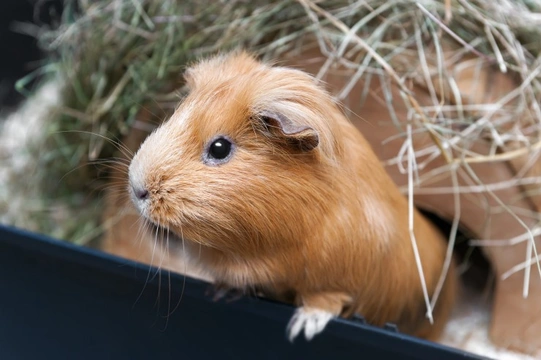
Guinea pigs and scurvy
Scurvy is a word that we don’t hear bandied around very much these days, and often, the word today summons up mental images of long sea voyages, pirates and disease, as scurvy was first identified in seagoing sailors who often had to go long periods of time without any fruit or veg.
While scurvy is virtually unheard of in people in the western world today, it is not a uniquely human condition, and animals too can develop it-with one of the most common of these being Guinea pigs.
If you keep Guinea pigs, it is really important to ensure that they eat a complete, balanced diet that provides all of the nutrients that they need to thrive and keep healthy-and also important to develop a basic understanding of scurvy in Guinea pigs and how it can develop-and how to prevent it. Read on to learn more.
What is scurvy?
Scurvy is a condition that comes about due to a lack of vitamin C in the diet, and leads to a variety of symptoms such as weakness and lethargy, bleeding from the mucous membranes, and sore spots on the skin of the body. In its advanced stages, scurvy can lead to jaundice of the skin, easily damaged and broken skin, and the development of suppurating wounds that rarely heal on their own and can be hard to treat. A lack of vitamin C also leads to an inability of the body to create collagen, which is important for healthy bones and tissues.
While some vitamins can be synthesized by the body itself, vitamin C is not one of them-neither humans nor Guinea pigs have the type of bodily systems that can create or produce their own vitamin C, and so, vitamin C must be provided as part of a balanced diet.
How do Guinea pigs develop scurvy?
Generally, scurvy in Guinea pigs happens because the pigs are not fed an appropriate diet that contains the right balance of vitamins such as vitamin C-but in some cases, even a guinea pig that is fed the right sort of diet can develop certain ailments and conditions that affect the body’s ability to absorb and use vitamin C, which essentially has the same effect.
What are the symptoms?
Scurvy in Guinea pigs is not something that happens suddenly, but instead, develops over time with progressively worsening symptoms if left unchecked. However, because the condition takes time to develop and become pronounced, it can be hard to spot the initial symptoms of the condition as they develop, and also, the conditions can be quite general and are easily confused with a whole range of other conditions.
One of the first symptoms of the onset of scurvy in Guinea pigs is lethargy, weakness and general malaise, and as the condition progresses, your pigs may begin to lose their fur in patches, which will have sore spots underneath that are either crusted and weeping, or visible just under the surface of the skin. These, and any other small wounds that your Guinea pig develops, will often spread and progress, and will prove to be hard to treat and heal normally. The texture of your Guinea pig’s fur is likely to become coarse, patchy and dull, and also, your pet is likely to lose weight, as well as their appetite.
As the condition worsens, your pet may have problems moving around or walking, as their bones weaken and their joints become sore and painful; and ultimately, left unchecked, scurvy in the Guinea pig can lead to death.
What can be done about it?
If you have any concerns about your Guinea pig’s health or condition, it is important to talk to your vet and get them to assess the problem and form a diagnosis as soon as possible.
If your vet diagnoses scurvy in your Guinea pig, the immediate course of treatment will be to get the right amount of vitamin C into them as soon as possible, which will likely mean being prescribed a vitamin C supplement that you will need to administer to your pet daily, for anything from a week to two weeks. This supplemental vitamin C will likely need to be given in injection form, as giving vitamin tablets is much less effective, and also, not all of the other minerals present in vitamin tablets are suitable for Guinea pigs.
Prevention
Feeding your Guinea pigs an appropriate, balanced diet that contains the right balance of vitamins and minerals with lots of fresh fruit and veg of the right types can help to prevent most cases of scurvy in Guinea pigs, but scurvy can also develop because the pet is unable to process vitamin C properly, which can occur regardless of the type of diet that your pet is fed.
If this is the case, your pet may need to have supplemental vitamin C given regularly for life, in order to manage the problem.



